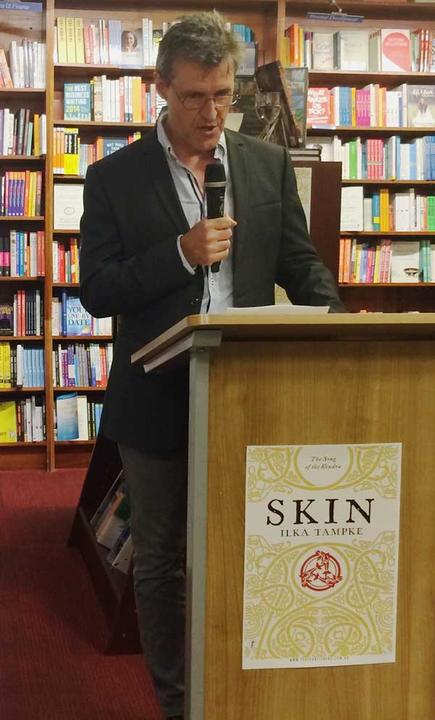Peter Houghton is an award-winning performer, writer and director, and a neighbour of Ilka Tampke. He launched her debut novel, Skin, with this funny and heartfelt speech at Readings Carlton last week.

I know Ilka because our kids went to school together and she was a neighbour. She was prone to these unannounced and, frankly, uninvited visits after school pick up. She’d plant herself at our dinner table like a mushroom and talk and talk...and talk.
I whispered to my wife, ‘Who’s the crazy woman in the living room?’
‘That’s Ilka.’
And then she started going round the back and just sort of coming in. Or sometimes you might come home and she’s already there, ready to talk. I’m exaggerating...sort of. But you get the picture.
Ilka’s not very good at small talk, I should mention. She talks big talk—the meaning of life is the starting point and then you kind of grow from there. And by the by we start looking forward to the visits—and then we miss them when they don’t happen, for whatever reason. And then, after a while, without even really realising it, you know you’re friends.
She admits, kind of shyly, in one of these uninvited visits that she’s writing a novel.
‘What’s it about?’
She says something like:
‘It’s about being uninitiated in a society where you can’t live without having been through certain rites of passage, without knowing the right people, without being part of the accepted culture.’
‘So...what...It’s set in the Melbourne club? The Australia Council?’
‘Roman Britain.’
‘Oh, right—good luck with that.’
Because it wasn’t the first time this had happened to me. Novels are usually half started, forgotten, dropped, never published, endlessly rejected, destroyed by lack of self confidence, lack of talent, lack of luck, or a million other things. So when she told me she was writing a novel I sort of flinched and tried to smile and thought—well, you’re an idiot.
She gave up her day job eventually and, with the support of her extraordinary family, she holed herself up in various drafty cottages and got into it.
And she didn’t hide behind post-modernism. You know the drill: ‘I’m writing in a completely new genre so you can’t compare me to anybody, actually.’
Instead, she bit off a chunky piece of genre—the novel set in a known historical period—and she set to.
Ilka, sitting at our table and in other places, told all—laid bare her fears, her feeling of not being able to measure up...
‘She’s here again!’
Teapot...second draft, no good, can I make it, can I do it...as she doggedly climbed the mountain. And here I think is the reason I’m so proud to call Ilka my friend and why she and the book inspire me. Because when I’m in that situation I shut out the world and hide myself in a hole. But she just got bigger—bigger as a human. In some way she kind of grew, her natural curiosity, her love, her fascination with people, with her character Ailia...And with these lessons that she has at the beginnings of the chapters that lead us on this journey through Britain in the first century AD.
The first chapter is deluge and flood, the last before the coda is destruction. In between are ideas like freedom, love, curses, ritual, truth, ceremony, boundaries, virtue, strength, self-knowledge, language, disturbance. Like a dramatist she constantly juggles—self-knowledge, lack of self knowledge, virtue, lack of virtue, what is virtue? Which character is virtuous, which is not? Who causes the destruction? Who makes it inevitable? All these massive questions.
And as I mentioned Ilka doesn’t duck the hard questions of moral logic. And as a novelist the logic that you live your life by becomes the art that critics may mock or chastise or sometimes, rarely, embrace. You are the product, your life is the text, your family and loved ones are the characters, at least in the beginning.
A novelist must be fit, talented, hard working, incisive, but most of all brave. Ilka means what she says. And she questions ruthlessly what she means.
As a child of Empire my place of dreaming was long ago turned into a Marks and Spencer. My cave paintings were graffitied by Romans before my family even spoke this language I’m speaking now. In the book Ilka wrestles with, but never gives easy answers to, this dance between progress and conservation. When I read the book I mourned the loss of my indigenous self lost somewhere back in the mists, a place I can’t return to or take my children to—a place that’s drifted so far into the mists now that it may never have existed at all. And it can’t be replaced by the love of a country or a sporting club—it’s gone. But maybe it’s about listening, stories, subtlety, sensitivity.
If I’m painting a slightly rosy picture of Ancient Britain remember that in the opening chapter a girl is torn limb from limb and the heroine has sex with a fish.
Basically, the novel moved me in ways I didn’t expect—and it’s an absolutely ripping yarn. What seemed impossible now seems like the logical expression of a talented artist, and an inspired and inspiring human being. And one of my personal heroes.



